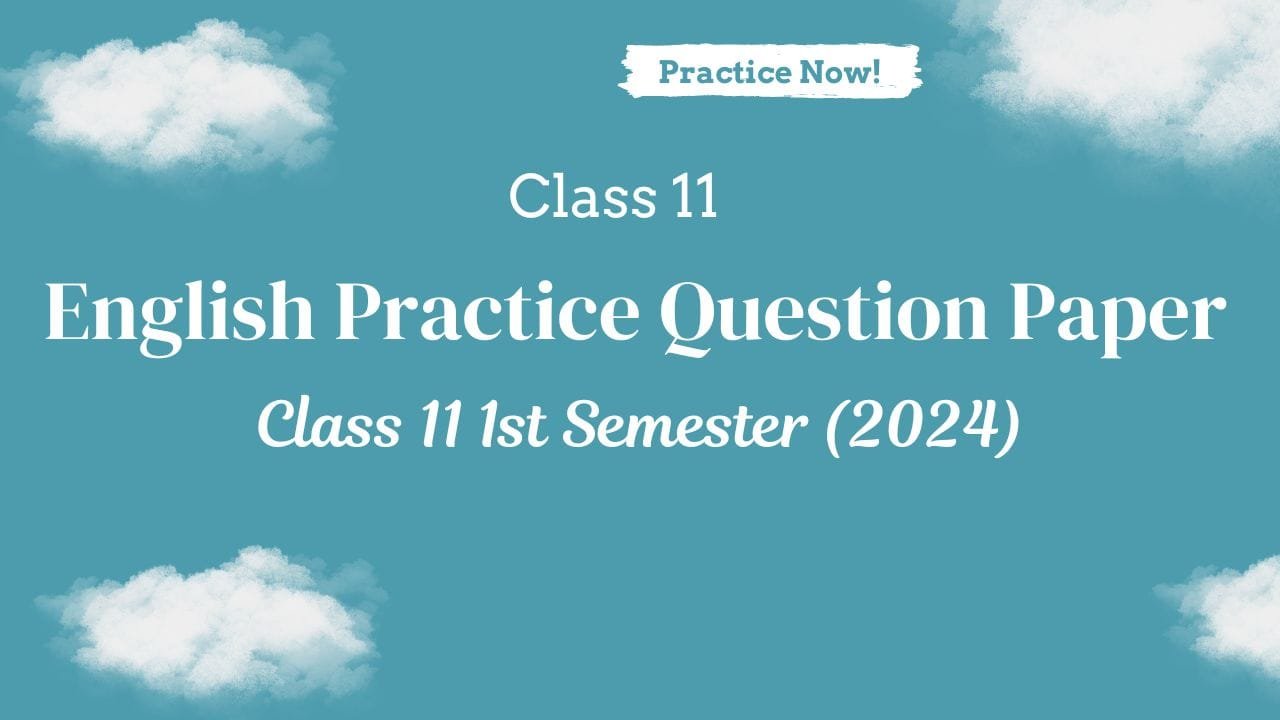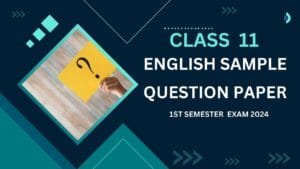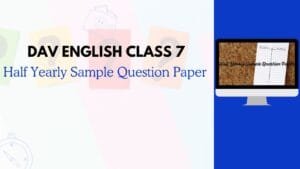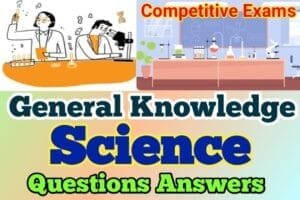The “Class 11 English Practice Question Paper 1st Semester (2024)” is a specially crafted practice exam intended for students in their first semester of 2024. It features questions tailored to the latest syllabus, assisting students in their exam preparation. Designed to align with the WBCHSE format, this paper addresses the core areas of the English curriculum.
English (B) Practice Questions
Class XI
1st Semester 2024
F.M – 40 Time: 1h15min
Instructions:
- The Question paper consists of 5 UNITS
- UNIT 1 contains 10 marks
- UNIT 2 contains 10 marks
- UNIT 3 contains 10 marks
- UNIT 4 contains 5 marks
- UNIT 5 contains 5 marks
- All Questions are Compulsory
- Each question carries 1 mark
UNIT 1: Prose
1. What does the astrologer’s “sharp, abnormal gleam” in his eyes signify?
A. His intense focus on finding customers
B. His deep prophetic powers
C. His dissatisfaction with his life
D. His fear of being discovered
2. Which of the following best describes the astrologer’s professional equipment?
A. Modern and technologically advanced
B. Traditional and mystical
C. Simple and mundane
D. Elaborate and decorative
Download Class 11 English (B) Suggestions 1st Semester PDF 2024
The notes cover a variety of MCQ questions and answers from prose, poetry, the rapid reader, and grammar. Get your complete PDF copy in one place now and start studying with confidence!

3. What effect did the saffron-colored turban have on the astrologer’s overall appearance?
A. It made him look more intelligent
B. It added to the powerful and impressive look of his eyes
C. It distracted from his dark whiskers
D. It indicated his high social status
4. Why was the astrologer’s location considered remarkable?
A. It was the quietest spot in the town
B. It attracted a diverse crowd and various trades
C. It was the only place where business could be conducted
D. It was close to the town hall park
5. What spiritual practice did Swami Vivekananda develop at a very young age?
A) Yoga
B) Meditation
C) Fasting
D) Samadhi
6. According to Ramakrishna Paramahamsa, Swami Vivekananda was born as a:
A) Karma Yogi
B) Brahmajnani
C) Bhakti Yogi
D) Raja Yogi
7. Swami Vivekananda’s religious ideas were described as:
A) Ritualistic and traditional
B) Abstract and philosophical
C) Iconoclastic and rebellious
D) Dogmatic and sectarian
8. What was Swami Vivekananda’s primary spiritual imperative?
A) Worship of the Mother
B) Realisation of Brahman
C) Advancement of social causes
D) Practice of meditation
Also read | English Sample Question Paper Class 11 1st Semester (2024)
9. What was the setting of the Swami’s announcement?
A) A crowded market
B) An open-air meal
C) A religious ceremony
D) A private conversation
10. How did the party feel about the preparations for the journey?
A) Reluctant
B) Excited
C) Nervous
D) Indifferent
Answer: B) Excited
UNIT 2: Verse
11. Wordsworth enjoys the beauty of the city of London while standing on
(a) the tower of London
(b) the ship
(c) the dome of St. Paul’s Cathedral
(d) the Westminster Bridge
12. According to Wordsworth, the city looks
(a) ugly
(b) lively
(c) most beautiful
(d) busy
13. The person who passes without enjoying the beauty of the London morning is
(a) dull
(b) innovative
(c) imaginative
(d) busy
14. “Dull would he be of soul’- Here ‘dull’ means
(a) unintelligent
(b) bored
(c) devoid of sense of beauty
(d) monotonous
15. What is the mood of the poem “The Bangle Sellers”?
a) Critical and questioning
b) Romantic and passionate
c) Happy and carefree
d) Melancholy and reflective
16. What is the significance of the bangles in the poem “The Bangle Sellers”?
a) They represent wealth
b) They symbolize love and marriage
c) They are a source of income for the sellers
d) They represent freedom
17. What is the main occupation of the individuals described in the poem?
a) Fruit sellers
b) Bangle sellers
c) Flower sellers
d) Cloth sellers
18. What creature is mentioned in the poem’s imagery?
A) Lion
B) Falcon
C) Tiger
D) Eagle
19. According to the poem, what is happening to “the centre”?
A) It is holding strong
B) It is falling apart
C) It is expanding
D) It is celebrating
20. What does the falcon symbolize in the poem?
A) Freedom
B) Destruction
C) Control
D) Chaos
UNIT 3: Rapid Reader
21. Who is the son of Macduff who becomes a symbol of hope for Scotland’s future?
A. Fleance
B. Donalbain
C. Malcolm
D. Macduff Jr.
22. Who is Macbeth’s rival for the Scottish throne, whose descendants are prophesized to become kings?
A. Duncan
B. Macduff
C. Banquo
D. Malcolm
23. Which character’s death triggers Macbeth’s descent into madness and despair?
A. Duncan
B. Lady Macbeth
C. Banquo
D. Fleance
24. Who is the king of Scotland at the beginning of the play, whose murder sets off a chain of events?
A. Duncan
B. Macbeth
C. Malcolm
D. Macduff
25. What was Desdemona’s preference in choosing a suitor?
a) Appearance and complexion
b) Wealth and status
c) Heart more than appearance and complexion
d) None of the above
26. What was Othello’s profession?
a) Senator
b) Nobleman
c) Soldier
d) Merchant
27. How was Othello regarded in the state of Venice?
a) Feared and despised
b) Hated and reviled
c) Highly esteemed and revered
d) None of the above
28. In the forest of Arden, the duke, and his companions lived like
A. Robinson Crusoe.
B. Rabindranath Tagore.
C. Robin Hood,
D. Romeo.
29. In the summer, the lawful duke and his companions
A. lay under the fine shade of the large forest trees.
B. would mark the playful sports of the wild deer.
C. both and B.
D. none.
30. According to the lawful duke, the chilling winds are
A. very disgusting.
B. very cruel.
C. true counselors.
D. real enemies.
UNIT 4: Textual Grammar
31. He was left for dead. [Transform into a complex sentence]
a) Because he was left, he was dead.
b) Since he was left, he was for dead.
c) As he was left, he was for dead.
d) He was left so that he could die.
32. He entrusted ___ a disciple a prayer to Her. [Fill in the blank with a suitable preposition.]
A) in
B) on
C) to
D) with
33. The Swami had told his beads. He had bathed in the ice-cold waters. [Join the sentences using Participles]
a) Telling his beads and bathing in the ice-cold waters, the Swami had completed the rites.
b) Having told his beads, the Swami bathed in the ice-cold waters.
c) The Swami told his beads, and he bathed in the ice-cold waters.
d) Telling his beads, the Swami had bathed in the ice-cold waters.
34. Convert the sentence “The river glideth at his own sweet will” into a complex sentence.
a) The river glideth at his own sweet will, and it is very serene.
b) The river glideth at his own sweet will, which makes it very serene.
c) Because the river glideth at his own sweet will, it is serene.
d) The river glideth, and it is serene at his own sweet will.
35. No one will buy these delicate, bright rainbow-tinted circles of light.[Turn into Affirmative Sentence]
a) Will someone buy these delicate, bright rainbow-tinted circles of light.
b) Everyone will buy these delicate, bright rainbow-tinted circles of light.
c) Some people will buy these delicate, bright rainbow-tinted circles of light.
d) Everyone is buying these delicate, bright rainbow-tinted circles of light.
UNIT 5: Reading Comprehension
Read the following paragraphs carefully and answer the questions given below:
National Google.com Day might only come around once a year. But to be honest, millions use their products every single day. National Google.com Day appreciates the monumental impact Google has had on the digital world. Google’s journey is remarkable. From a project kicked off in a garage, Google.com grew from a simple search engine into a worldwide tech giant. Google’s history dates back to January 1996. That’s when Stanford Ph.D. candidates Larry Page and Sergey Brin decided it was time for the world to have a much better search engine. Before they started their project, online information was stored in directories. Those early offerings were not very user-friendly, to say the least. They developed the PageRank algorithm. In doing so, they revolutionized web searching by analyzing website relationships. Initially named “BackRub,” the project soon transformed into Google. The dynamic duo registered the domain name google.com on September 15, 1997. That name registration marked the beginning of a new era. The company they had started would become the dominant force on the internet. Google began its journey in a friend’s garage in Menlo Park, California. But it grew fast, from a beta search engine and into a household name. The transition to the iconic Googleplex in Mountain View, California, and the company’s restructuring into Alphabet Inc. in 2015 are additional milestones to know about Google’s history.
Transform into a digital archaeologist for the day. Dig deep into the annals of Google’s past. It started from humble beginnings in a garage and its transformation into a tech behemoth. Want to add a layer of levity? Consider dressing up as a 90s tech geek for added effect! Use Google to find the most obscure—or hilarious—facts you can. Maybe use Google to learn where you might find the world’s largest rubber duck. Or perhaps you should know all about the history of the world’s first potato chip. Share these fun facts with friends and challenge yourself. Then, challenge your buddies to find something even more bizarre. Pen down a humorous blog or journal entry detailing your life “pre-Google” versus “post-Google.” Imagine a world where asking Google wasn’t an option – the horror! Host a party where every guest uses a different Google service to contribute. Here’s an example: One pal can find the location on Maps. Another friend sets up the event on Calendar. Yet another guest uses Translate to label the snack table in another language.
Visit Llanfairpwllgwyngyllgogerychwyrndrobwllllantysiliogogogoch in Wales. It will be fun just for the sake of saying you’ve been there (virtually). Be sure to video the hilarity as you read the correct pronunciation out loud. (Bet you can’t say it!) Hold a competition among your friends to design your own Google Doodle. The more outlandish, the better. Who knows? Your doodling might be quirky enough to catch Google’s eye! Spend an hour asking Google Assistant the silliest questions you can think of. “Hey Google, what does a unicorn sound like?” You can also tell it, “Tell me a dad joke.” Google Assistant has a vast library of jokes and will happily accommodate your requests. Send an email to your future self using Gmail, making predictions about what your future looks like. You might also include some notes to remind yourself of today’s good (or awkward) times. Create a bingo card with a balance of common and unusual sights. Common sights might be a blue SUV or a brunette. However, unusual sights might be a yellow VW bug or a dog walker with more than four dogs, etc.. Then, try to find them on Google Street View. The first one to fill the card gets to yell, “Bingo!” Give out some nerd-inspired prizes to the winners. Use Google to find the most outlandish recipe and attempt to bake it. Don’t forget – if you bake it, you have to try it yourself! Bonus points for using Google Home as your sous-chef!
36. What marked the beginning of Google’s transformation into a dominant force on the internet?
A) The creation of the PageRank algorithm
B) The registration of the domain name google.com
C) The transition to the Googleplex in Mountain View
D) The restructuring into Alphabet Inc. in 2015
37. Which of the following activities is NOT suggested in the paragraphs for celebrating National Google.com Day?
A) Dressing up as a 90s tech geek
B) Visiting Llanfairpwllgwyngyllgogerychwyrndrobwllllantysiliogogogoch
C) Creating a bingo card with common and unusual sights on Google Street View
D) Asking Google Assistant to tell you a dad joke
38. According to the paragraphs, what significant change happened to Google in 2015?
A) The launch of Google Maps
B) The company restructured into Alphabet Inc.
C) The introduction of Google Assistant
D) The creation of Google Doodles
39. What was the original name of the project that eventually became Google?
A) PageRank
B) BackRub
C) Googleplex
D) Alphabet Inc.
40. Which suggestion involves using Google in a fun and interactive way with friends?
A) Videoing the pronunciation of Llanfairpwllgwyngyllgogerychwyrndrobwllllantysiliogogogoch
B) Creating a humorous blog or journal entry
C) Designing your own Google Doodle
D) Using Google to find the world’s largest rubber duck







